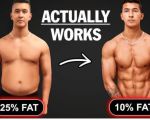
Gym Workouts for Muscle Definition: Effective Plans, Training Tips & Real Results
Jul 22, 2025

Gym Workout Plan for Losing Belly Fat: Weekly Strategy, Strength Training & Real Results
Jul 22, 2025

Best Gym Workout Routine for Muscle Gain Fast Women | Proven Tips & Real Results
Jul 21, 2025

Gym Workouts for Improving Reaction Time: Best Methods and Real Results
Jul 21, 2025

Gym Workout Routine for Older Adults: Safe and Effective Fitness Over 50
Jul 21, 2025

Gym Workout Routine for Fat Loss Women Beginners Fast and Effectively
Jul 21, 2025

Gym Workout for Improving Agility: Exercises and Pro Tips That Work
Jul 17, 2025

Gym Workout Plan for Building Muscle Fast for Women
Jul 17, 2025







